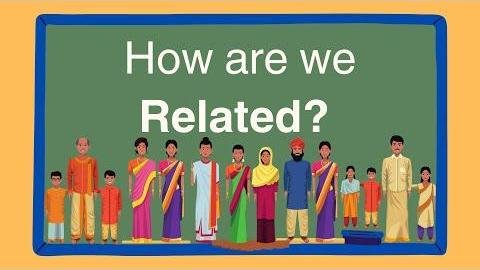Introduction
Tamil culture places a strong emphasis on family and community. Understanding the different terms used to address family members can be confusing for many people. In this article, we will explore the various relationships and terms used to address family members in Tamil.
Parents: The Petrol of the Family 🚗💑
In Tamil, “amma” means mom and “appa” means dad. These terms are equivalent to “mom” and “dad” in English.
Siblings: The Sahodaras 👧👦👧🧑
The Tamil language has specific terms to address siblings. For instance, “akka” refers to an older sister, while “tange” is used for a younger sister. Similarly, “anna” is an older brother, and “tambi” is a younger brother. The term “sahodara” encompasses all siblings.
Extended Family: From Amma to Amaapah 🧓🧒
When it comes to addressing grandparents, maternal grandma is called “amma” and maternal grandpa is called “amapa.” On the other hand, paternal grandma is referred to as “achi” and paternal grandpa as “aya.” These terms can also be used more generally to address any grandmother or grandfather.
Grandchildren and Great-Grandparents 🧡👵👴🧡
Addressing grandchildren follows a simple pattern. For instance, “pera” is used for grandchildren.
In-Laws: The Mammas and Appas 🤵👰
When a person gets married, their spouse becomes their “atan” (husband) or “ani” (wife). In-laws are addressed as “mama” or “mami.”
Aunts, Uncles, and Cousins: From Akka to Pityappa 🌻👨👩👧👦
The term “akka” becomes “pidiamma” when addressing an aunt, and “pediapa” when referring to an uncle. Similarly, cousins are addressed as “mama” or “mami.” The terms “cinema” and “city” have evolved to “sithi” and “enti” respectively in some communities.
Treating Everyone Like Family 🤗👪
In Tamil culture, there is a strong sense of treating others as family. This tradition stems from the belief that everyone in the world is kin. Therefore, even strangers are given the respect and connection of family members.
Genetic Similarities: Brothers and Sisters Share More Than Love ❤️🧬
Siblings, especially those of the same sex, share a considerable amount of genetic material. Brothers share more similarities in their DNA than brothers and sisters do. Understanding the genetic similarities can be important when considering medical attention or assessing the risk of certain diseases.
The Changing Nature of Addressing Family 🔄🗣️
The way family members are addressed may vary based on community or region. Some communities have altered the names used to address family members, and nicknames might be used as well. The influence of colonization has led to changes in vocabulary, and some words have been replaced by their English counterparts.
The Wholesome Tamil Way of Life 🌍🌻
Tamil heritage teaches us to see the world in a connected and harmonious way. Not only are humans seen as family, but also plants, trees, animals, and nature as a whole. This interconnectedness is a fundamental principle of Tamil culture and a reminder of how our ancestors viewed the world.
Conclusion
Understanding and addressing family members in Tamil can be complex. However, it is an important part of preserving Tamil heritage and culture. By teaching kids to address family members and asking questions, we can continue to learn and appreciate the rich traditions of Tamil culture.
Thank you for watching this video. If you found it interesting and helpful, please share it with others. Stay tuned for our next video!
Disclaimer: The video content displayed above was created and is the property of What You Missed In Tamil Class. We do not claim any rights to this content and are not in any way endorsing or affiliated with the creators. This video is embedded here for informational/entertainment purposes only. The accompanying articles, although sometimes narrated in the first person, are independently written by our editorial team and do not necessarily reflect the views or expressions of the video creators.




